Adopted by the General Assembly
Union of American Hebrew Congregations
October 29-November 2, 1997 Dallas
Background
In 1987, the Union of American Hebrew Congregations (UAHC) reaffirmed its commitment to welcoming gay and lesbian Jews into its congregations and encouraging their participation in all aspects of synagogue and communal life. In 1993, Rabbi Alexander M. Schindler, President of the UAHC, called upon the Reform movement to support the right of gay and lesbian couples to adopt children, to file joint income-tax returns, and to share in health and death benefits provided to heterosexual couples by federal, state, and local governments and by both large and small corporations. Following Rabbi Schindler's call, the UAHC, in 1993, resolved that full equality under the law for gay men and lesbians requires legal recognition of monogamous domestic gay and lesbian relationships.
In 1990, the Central Conference of American Rabbis (CCAR) adopted a position paper encouraging rabbis and congregations to treat with respect and to integrate fully all Jews into the life of the community regardless of sexual orientation and acknowledging the need for continuing discussion regarding the religious status of monogamous domestic relationships between gay men or lesbians and the creation of special ceremonies. In April 1996, the CCAR adopted a resolution supporting the right of gay and lesbian couples to share fully and equally in the benefits of civil marriage.
In addition, the Canadian Council for Reform Judaism (CCRJ) has supported the extension of spousal benefits to same-sex partners in relationships which would be deemed "common law" marriages if the partners were heterosexual. The CCRJ also supported the 1996 amendments to the Canada Human Rights Act to add "sexual orientation" as a prohibited ground for discrimination.
In the years since first the UAHC and subsequently the CCAR gave their support for full equality for gay men and lesbians in congregational life, gay men and lesbians have increasingly come forward to participate in the life of Reform Judaism on national, regional, and local levels. No less than heterosexual couples, gay men or lesbians living in monogamous domestic relationships have demonstrated, like their counterparts, love for one another, compassion for the sick, and grief for the dead.
The UAHC has for decades provided moral leadership to the Jewish community and to our nation, recognizing our differences and diversity, but acknowledging that we are but one family, equal before God. In this spirit, the UAHC must now move more forcefully to support the monogamous domestic relationships of gay men and lesbians.
Legal recognition of monogamous domestic gay and lesbian relationships and congregational honoring of these couples will together provide these men and women and their families with dignity and self esteem.
In 1993, the UAHC General Assembly resolution called for recognition for Lesbian and Gay relationships: A) by governmental legislation as to participation in health plans and survivor benefits, as to fitness to raise children, and as to legal acknowledgment of the relationship; and B) by congregations and institutions of the Reform movement to extend benefits to partners of staff members and employees.
A separate secular movement is proceeding to recognize these monogamous domestic relationships judicially and statutorily and to grant to gay and lesbian couples nondiscriminatory economic, legal, and social rights equal to those under law enjoyed by monogamous heterosexual couples.
THEREFORE, the Union of American Hebrew Congregations resolves to:
- Support secular efforts to promote legislation which would provide through civil marriage equal opportunity for gay men and lesbians;
- Encourage its constituent congregations to honor monogamous domestic relationships formed by gay men or lesbians; and
- Support the efforts of the CCAR in its ongoing work as it studies the appropriateness of religious ceremonies for use in a celebration of commitment recognizing a monogamous domestic relationship between two Jewish gay men or two Jewish lesbians.
Give to the URJ
The Union for Reform Judaism leads the largest and most diverse Jewish movement in North America.
